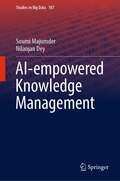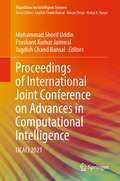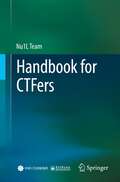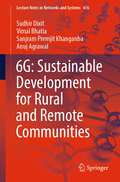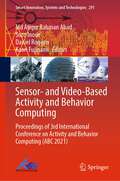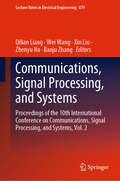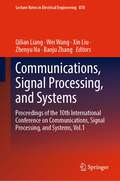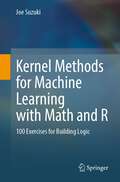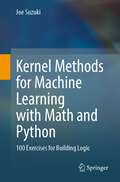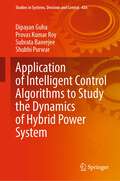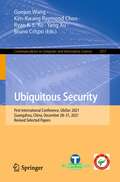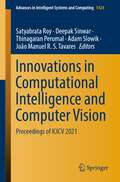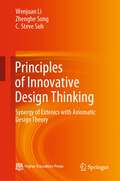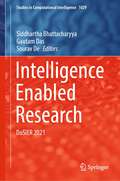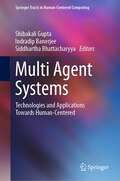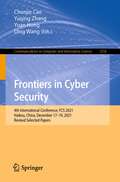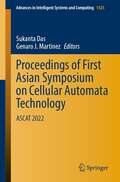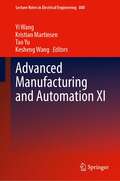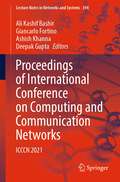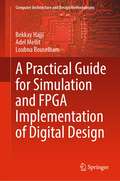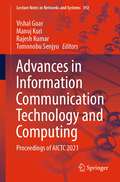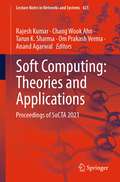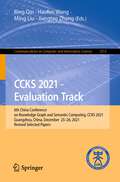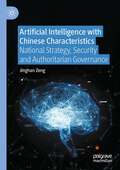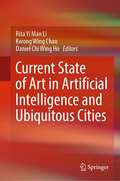- Table View
- List View
AI-empowered Knowledge Management (Studies in Big Data #107)
by Soumi Majumder Nilanjan DeyThis book is focused on AI-empowered knowledge management to improve processes, implementation of technology for providing easy access to knowledge and the impact of knowledge management to promote the platform for generation of new knowledge through continuous learning. The book discusses process of knowledge management which includes entirety of the creation, distribution, and maintenance of knowledge to achieve organizational objectives. It also covers knowledge management tools which enable and enhance knowledge creation, codification, and transfer within business firms thereby reducing the burden of work and allowing application of resources and effective usage towards practical tasks. An immense growth of artificial intelligence in business organizations has occurred and AI-empowered knowledge management practice is leading towards growth and development of the organization.
Proceedings of International Joint Conference on Advances in Computational Intelligence: IJCACI 2021 (Algorithms for Intelligent Systems)
by Mohammad Shorif Uddin Prashant Kumar Jamwal Jagdish Chand BansalThis book gathers outstanding research papers presented at the 5th International Joint Conference on Advances in Computational Intelligence (IJCACI 2021), held online during October 23–24, 2021. IJCACI 2021 is jointly organized by Jahangirnagar University (JU), Bangladesh, and South Asian University (SAU), India. The book presents the novel contributions in areas of computational intelligence and it serves as a reference material for advance research. The topics covered are collective intelligence, soft computing, optimization, cloud computing, machine learning, intelligent software, robotics, data science, data security, big data analytics, and signal and natural language processing.
Handbook for CTFers
by Nu1L Team“Handbook for CTFers: Zero to One” was written by the Nu1L team, one of China’s top CTF teams. As for Jeopardy-style CTFs, the content in the first 10 chapters of this book not only covers traditional categories of tasks like WEB, PWN and Crypto, but also includes some of the latest hot topics and techniques, such as blockchain. Case studies are provided for all of these types. Onsite Attack-Defend-style CTFs and penetration testing are introduced in Chapter 11 and Chapter 12. In order to help readers gain the most from the book, we have developed the N1Book platform, which addresses practical questions for different task categories. The book offers beginners a reliable, systematic tutorial on CTF competition. At the same time, it includes real case studies and a wealth of our competition experience, making it a valuable asset for experienced CTF players.
6G: Sustainable Development for Rural and Remote Communities (Lecture Notes in Networks and Systems #416)
by Sudhir Dixit Vimal Bhatia Sanjram Premjit Khanganba Anuj AgrawalThe book covers a variety of feasible technology options, both wired and wireless, to enable 6G connectivity in rural and remote regions. Along with the enabling technology options, the book also covers important aspects such as human-computer interaction, business models for the local operator ecosystem, regulatory and right-of-way policies, security and privacy, and future challenges related to technology migration, urbanization, and scalability. A special feature of this book is that it covers both the optical and wireless technology aspects to realize 6G connectivity, which will be of interest to a broad range of researchers and practitioners. Detailed figures have been included in the book to cover both the fiber-optics and wireless aspects. These figures include telecommunication equipment and networks ranging from a locality to the under-sea cables to high latitude platforms. The book has simple explanations, pictorial representations, minimal math, and conversational language, which will enable all the readers to grasp it, thereby helping them in decision making and performing comprehensive analysis. This book includes the needs of the unconnected and under-connected sections of the society, notably from the rural and remote areas, when the 6G standards are being discussed and developed. This feature will help overcome the challenge of widening the digital divide from every new generation of mobile network standards. Hence, the book covers all technical and non-technical aspects to be of interest to researchers, decision-makers, academia, social workers, and the readers in technology, growth, and empowerment.
Sensor- and Video-Based Activity and Behavior Computing: Proceedings of 3rd International Conference on Activity and Behavior Computing (ABC 2021) (Smart Innovation, Systems and Technologies #291)
by Md Atiqur Rahman Ahad Sozo Inoue Daniel Roggen Kaori FujinamiThis book presents the best-selected research papers presented at the 3rd International Conference on Activity and Behavior Computing (ABC 2021), during 20–22 October 2021. The book includes works related to the field of vision- and sensor-based human action or activity and behavior analysis and recognition. It covers human activity recognition (HAR), action understanding, gait analysis, gesture recognition, behavior analysis, emotion, and affective computing, and related areas. The book addresses various challenges and aspects of human activity recognition—both in sensor-based and vision-based domains. It can be considered as an excellent treasury related to the human activity and behavior computing.
Communications, Signal Processing, and Systems: Proceedings of the 10th International Conference on Communications, Signal Processing, and Systems, Vol. 2 (Lecture Notes in Electrical Engineering #879)
by Qilian Liang Wei Wang Xin Liu Zhenyu Na Baoju ZhangThis book brings together papers presented at the 2021 International Conference on Communications, Signal Processing, and Systems, which provides a venue to disseminate the latest developments and to discuss the interactions and links between these multidisciplinary fields. Spanning topics ranging from communications, signal processing and systems, this book is aimed at undergraduate and graduate students in Electrical Engineering, Computer Science and Mathematics, researchers and engineers from academia and industry as well as government employees (such as NSF, DOD and DOE).
Communications, Signal Processing, and Systems: Proceedings of the 10th International Conference on Communications, Signal Processing, and Systems, Vol.1 (Lecture Notes in Electrical Engineering #878)
by Qilian Liang Wei Wang Xin Liu Zhenyu Na Baoju ZhangThis book brings together papers presented at the 2021 International Conference on Communications, Signal Processing, and Systems, which provides a venue to disseminate the latest developments and to discuss the interactions and links between these multidisciplinary fields. Spanning topics ranging from communications, signal processing and systems, this book is aimed at undergraduate and graduate students in Electrical Engineering, Computer Science and Mathematics, researchers and engineers from academia and industry as well as government employees (such as NSF, DOD and DOE).
Kernel Methods for Machine Learning with Math and R: 100 Exercises for Building Logic
by Joe SuzukiThe most crucial ability for machine learning and data science is mathematical logic for grasping their essence rather than relying on knowledge or experience. This textbook addresses the fundamentals of kernel methods for machine learning by considering relevant math problems and building R programs. The book’s main features are as follows:The content is written in an easy-to-follow and self-contained style.The book includes 100 exercises, which have been carefully selected and refined. As their solutions are provided in the main text, readers can solve all of the exercises by reading the book.The mathematical premises of kernels are proven and the correct conclusions are provided, helping readers to understand the nature of kernels.Source programs and running examples are presented to help readers acquire a deeper understanding of the mathematics used.Once readers have a basic understanding of the functional analysis topics covered in Chapter 2, the applications are discussed in the subsequent chapters. Here, no prior knowledge of mathematics is assumed.This book considers both the kernel for reproducing kernel Hilbert space (RKHS) and the kernel for the Gaussian process; a clear distinction is made between the two.
Kernel Methods for Machine Learning with Math and Python: 100 Exercises for Building Logic
by Joe SuzukiThe most crucial ability for machine learning and data science is mathematical logic for grasping their essence rather than relying on knowledge or experience. This textbook addresses the fundamentals of kernel methods for machine learning by considering relevant math problems and building Python programs. The book’s main features are as follows:The content is written in an easy-to-follow and self-contained style.The book includes 100 exercises, which have been carefully selected and refined. As their solutions are provided in the main text, readers can solve all of the exercises by reading the book.The mathematical premises of kernels are proven and the correct conclusions are provided, helping readers to understand the nature of kernels.Source programs and running examples are presented to help readers acquire a deeper understanding of the mathematics used.Once readers have a basic understanding of the functional analysis topics covered in Chapter 2, the applications are discussed in the subsequent chapters. Here, no prior knowledge of mathematics is assumed.This book considers both the kernel for reproducing kernel Hilbert space (RKHS) and the kernel for the Gaussian process; a clear distinction is made between the two.
Application of Intelligent Control Algorithms to Study the Dynamics of Hybrid Power System (Studies in Systems, Decision and Control #426)
by Dipayan Guha Provas Kumar Roy Subrata Banerjee Shubhi PurwarThis book aims to systematically review and design different intelligent control algorithms for the small-signal stability assessment of HPS. With the growing consciousness of global warming and the fast depletion of natural power generation resources, the existing power system is on the verge of transitions to a “hybrid power system (HPS)” integrated with distributed energy resources. The recent results and requirements for the developments of intelligent control algorithms have motivated the authors to introduce this book for extensively analyzing the performance of HPS against unknown/uncertain disturbances. This book introduces fractional-order resilient control methodologies for arresting small-signal instability of HPS. The prospective investigation has been performed on the MATLAB platform. This book is helpful for undergraduate, postgraduate students, and research scholars working in power system stability, control applications, and soft computing in particular.
Ubiquitous Security: First International Conference, UbiSec 2021, Guangzhou, China, December 28–31, 2021, Revised Selected Papers (Communications in Computer and Information Science #1557)
by Guojun Wang Kim-Kwang Raymond Choo Ryan K. L. Ko Yang Xu Bruno CrispoThis volume constitutes selected papers presented at the First Inernational Conference on Ubiquitous Security, UbiSec 2021, held in Guangzhou, China, in December 2021.The presented 26 full papers and 2 short papers were thoroughly reviewed and selected from the 96 submissions. They focus on security, privacy and anonymity aspects in cyberspace, physical world, and social networks.
Innovations in Computational Intelligence and Computer Vision: Proceedings of ICICV 2021 (Advances in Intelligent Systems and Computing #1424)
by Satyabrata Roy Deepak Sinwar Thinagaran Perumal Adam Slowik João Manuel R. S. TavaresThis book presents high-quality, peer-reviewed papers from the International Conference on “Innovations in Computational Intelligence and Computer Vision (ICICV 2021),” hosted by Manipal University Jaipur, Rajasthan, India, on August 5–6, 2021. Offering a collection of innovative ideas from researchers, scientists, academics, industry professionals and students, the book covers a variety of topics, such as artificial intelligence and computer vision, image processing and video analysis, applications and services of artificial intelligence and computer vision, interdisciplinary areas combining artificial intelligence and computer vision, and other innovative practices.
Principles of Innovative Design Thinking: Synergy of Extenics with Axiomatic Design Theory
by Wenjuan Li Zhenghe Song C. Steve SuhThe book presents a comprehensive treatment on a novel design theory that fosters innovative thinking and creativity essential for addressing wicked problems. Wicked problems are ill-defined, ambiguous in both aims and solutions, and complex with interconnected and intertwined (coupled) factors. While being ubiquitous and difficult, however, wicked problems share characteristics common to science and design in three regards, namely agent finitude, system complexity, and problem normativity. These fundamental attributes allow a core cognitive process common to design and science to be identified and a strategic problem-solving conception of methodology be formulated as a result. The theory facilitates new opportunities for synergetic cross-disciplinary research and practice by incorporating the essences of Extenics to axiomatic design. Innovative thinking is enabled by exploring Extenics for problem reframing, paradigm shift, and abductive reasoning and by engaging axiomatic design in the co-evolution (iteration) of the need and viable design concept. The theory is unique in that it is a framework for quantifying imprecise and vague design information available during the conceptual design stage as mathematical expression and algorithm early in the design effort and enables the objective evaluation and emergence of an optimal design concept from among multitude of viable ones. The book is conceived for students and real-world practitioners in engineering, natural and social sciences, business, and fine arts who seek to develop powerful design thinking for solving problems in a creative and innovative way.
Intelligence Enabled Research: DoSIER 2021 (Studies in Computational Intelligence #1029)
by Siddhartha Bhattacharyya Gautam Das Sourav DeThis book gathers extended versions of papers presented at DoSIER 2021 (the 2021 Third Doctoral Symposium on Intelligence Enabled Research, held at Cooch Behar Government Engineering College, West Bengal, India, during November 12–13, 2021). The papers address the rapidly expanding research area of computational intelligence, which, no longer limited to specific computational fields, has since made inroads in signal processing, smart manufacturing, predictive control, robot navigation, smart cities, and sensor design, to name but a few. Presenting chapters written by experts active in these areas, the book offers a valuable reference guide for researchers and industrial practitioners alike and inspires future studies.
Multi Agent Systems: Technologies and Applications towards Human-Centered (Springer Tracts in Human-Centered Computing)
by Shibakali Gupta Indradip Banerjee Siddhartha BhattacharyyaThe book presents latest multi-agent technologies in human-centered computing (HCC) to provide a new research direction to enrich the human socio computations. Nowadays, the research in the field of multi-agent system (MAS) has gained a wide spread recognition due to its interdisciplinary nature and a vast versatile application domain including engineering, social science, economics, mathematics, operational research, etc. It has been proved that agents in MAS are the most appropriate technological paradigm for providing the most optimal solution for different kinds of complex real world problems that may be industrial or it might be specifically related to social problems. Keeping these features in mind, we planned to tune the research of latest multi-agent technologies and tried to compose its effect on HCC corridor. The primary audience of this book are research students of computer science, information technology and it will be also very helpful for software professionals to get developmental ideas to boost their computing activities.
Frontiers in Cyber Security: 4th International Conference, FCS 2021, Haikou, China, December 17–19, 2021, Revised Selected Papers (Communications in Computer and Information Science #1558)
by Chunjie Cao Yuqing Zhang Yuan Hong Ding WangThis volume constitutes the proceedings of the 4th International Conference on Frontiers in Cyber Security, FCS 2021, held in Haikou, China, in December 2021. The 20 full papers along with the 2 short papers presented were carefully reviewed and selected from 58 submissions. The papers are organized in topical sections on: intelligent security; system security; network security; multimedia security; privacy, risk and trust; data and application security.
Proceedings of First Asian Symposium on Cellular Automata Technology: ASCAT 2022 (Advances in Intelligent Systems and Computing #1425)
by Sukanta Das Genaro J. MartinezThis book gathers selected research papers presented at the First Asian Symposium on Cellular Automata Technology (ASCAT 2022), organized online by academicians from Kolkata, India, during March 3–5, 2022. The book presents one of the most emergent areas in natural computing, cellular automaton (CA). CA is a paradigm of uniform fine-grained parallel computation which has been explored to understand complex systems by developing its model at the microscopic level. The book discusses many real-life problems in the domain of very large-scale integration (VLSI) design and test, pattern recognition and classification, cryptography, pseudo-random pattern generation, image processing, sensor networks, material science, etc., by using CA.
Advanced Manufacturing and Automation XI (Lecture Notes in Electrical Engineering #880)
by Yi Wang Kristian Martinsen Tao Yu Kesheng WangThe proceedings collect selected papers from the 11th International Workshop of Advanced Manufacturing and Automation (IWAMA 2021), held in Zhengzhou Polytechnic, China on 11 - 12 October, 2021. Topics focusing on novel techniques for manufacturing and automation in Industry 4.0 are now vital factors for the maintenance and improvement of the economy of a nation and the quality of life. It will help academic researchers and engineering to implement the concept, theory and methods in Industry 4.0 which has been a hot topic. These proceedings will make valuable contributions to academic researchers, engineers in the industry for the challenges in the 4th industry revolution and smart factories.
Proceedings of International Conference on Computing and Communication Networks: ICCCN 2021 (Lecture Notes in Networks and Systems #394)
by Ali Kashif Bashir Giancarlo Fortino Ashish Khanna Deepak GuptaThis book includes selected peer-reviewed papers presented at the International Conference on Computing and Communication Networks (ICCCN 2021), held at Manchester Metropolitan University, United Kingdom, during 19–20 November 2021. The book covers topics of network and computing technologies, artificial intelligence and machine learning, security and privacy, communication systems, cyber physical systems, data analytics, cyber security for Industry 4.0, and smart and sustainable environmental systems.
A Practical Guide for Simulation and FPGA Implementation of Digital Design (Computer Architecture and Design Methodologies)
by Bekkay Hajji Adel Mellit Loubna BouselhamThis book introduces the FPGA technology used in the laboratory sessions, and provides a step-by-step guide for designing and simulation of digital circuits. It utilizes the VHDL language, which is one of the most common language used to describe the design of digital systems. The Quartus II, Xilinx ISE 14.7 and ModelSim software are used to process the VHDL code and make simulations, and then the Altera and Xilinx FPGA platforms are employed to implement the simulated digital designs. The book is composed of four parts. The first part of this book has two chapters and covers various aspects: FPGA architectures, ASIC vs FPGA comparison, FPGA design flow and basic VHDL concepts necessary to describe the design of digital systems. The second part of the book includes three chapters that deal with the design of digital circuits such as combinational logic circuits, sequential logic circuits and finite state machines. The third part of the book is reserved for laboratory projects carried out on the FPGA platform. It is a largely hands-on lab class for design digital circuits and implementing their designs on the Altera FPGA platform. Finally, the fourth part of this work is devoted to recent applications carried out on FPGAs, in particular advanced techniques in renewable energy systems. The book is primarily intended for students, scholars, and industrial practitioners interested in the design of modern digital systems.
Advances in Information Communication Technology and Computing: Proceedings of AICTC 2021 (Lecture Notes in Networks and Systems #392)
by Vishal Goar Manoj Kuri Rajesh Kumar Tomonobu SenjyuThe book is a collection of best selected research papers presented at the International Conference on Advances in Information Communication Technology and Computing (AICTC 2021), held in Government Engineering College Bikaner, Bikaner, India, during 20–21 December 2021. The book covers ICT-based approaches in the areas of ICT for energy efficiency, life cycle assessment of ICT, green IT, green information systems, environmental informatics, energy informatics, sustainable HCI or Artificial intelli computational sustainability.
Soft Computing: Proceedings of SoCTA 2021 (Lecture Notes in Networks and Systems #425)
by Rajesh Kumar Chang Wook Ahn Tarun K. Sharma Om Prakash Verma Anand AgarwalThis book focuses on soft computing and how it can be applied to solve real-world problems arising in various domains, ranging from medicine and healthcare, to supply chain management, image processing, and cryptanalysis. It gathers high-quality papers presented at the International Conference on Soft Computing: Theories and Applications (SoCTA 2021), organized online. The book offers valuable insights into soft computing for teachers and researchers alike; the book will inspire further research in this dynamic field.
CCKS 2021 - Evaluation Track: 6th China Conference on Knowledge Graph and Semantic Computing, CCKS 2021, Guangzhou, China, December 25-26, 2021, Revised Selected Papers (Communications in Computer and Information Science #1553)
by Bing Qin Haofen Wang Ming Liu Jiangtao ZhangThis volume constitutes papers presented at the Evaluation Track of the 6th China Conference on Knowledge Graph and Semantic Computing, CCKS 2021, held in Guangzhou, China, in December 2021.The 17 competition papers went through a rigorious peer review and were accepted for publication. CCKS 2021 technology evaluation track aims to provide researchers with platforms and resources for testing knowledge and semantic computing technologies, algorithms and systems, promote the technical development in the field of domestic knowledge, and the integration of academic achievements and industrial needs.
Artificial Intelligence with Chinese Characteristics: National Strategy, Security and Authoritarian Governance
by Jinghan Zeng“This book provides the first book-lengthy study focusing on Artificial Intelligence (AI) with Chinese characteristics, in line with China’s open ambition of becoming an AI superpower by 2030. China’s unique domestic politics has developed distinct characteristics for its AI approach. By analysing national strategy, security and governance aspects of AI in China, this book argues that China’s AI approach is sophisticated and multifaceted, and it has brought about both considerable benefits and challenges to China. First, many characterize China’s AI approach as a nationally concerted top-down geopolitical strategy to advance Beijing’s unified objective. This book argues that this view is mistaken. It shows that China’s AI politics is largely shaped by economically rather than geopolitically motivated domestic stakeholders. In addition, China’s national AI plan is an upgrade of existing local AI initiatives to the national level, reflecting a bottom-up development. Thus, China’s AI strategy is more of a political manifesto rather than a concrete policy plan. The second part of the book discusses how the Chinese central government has been securitizing AI in order to mobilize local states, market actors, intellectuals and the general public. This security discourse is built on China’s historical anxieties about technology, regime security needs and the growing tension caused by great power competition. Despite its help in convincing domestic actors, however, this securitization trend may undermine key AI objectives. The third part of the book studies the Chinese governance approach to the use of AI. It argues that China’s bold AI practices are part of its broad and incoherent adaptation strategy to governance by digital means. AI is part of a digital technology package that the Chinese authoritarian regime has actively employed not only to improve public services but also to strengthen its authoritarian governance. While China’s AI progress benefits from its unique political and social environment, its ambitious AI plan contains considerable risks. China’s approach is gambling on its success in (a) delivering a booming AI economy, (b) ensuring a smooth social transformation to the age of AI, and (c) proving ideological superiority of its authoritarian and communist values. This book suggests that a more accurate understanding of AI with Chinese characteristics is essential in order to inform the debate regarding what lessons can be learnt from China’s AI approach and how to respond to China’s rise as the AI leader if not superpower.”
Current State of Art in Artificial Intelligence and Ubiquitous Cities
by Rita Yi Man Li Kwong Wing Chau Daniel Chi Wing HoThis book covers artificial intelligence and ubiquitous cities. It discusses the applications of the relevant tools in bringing revolutionary new lives to mankind. It showcases various applications of artificial intelligence in benefiting human society. For example, AI classification shortens the human time required for classifying court cases; humanoid robots help us perform heavy-duty jobs like humans, connect all the smart home devices, and take care of the kids and the elderly. It also presents the application of AutoML to predict housing prices.
